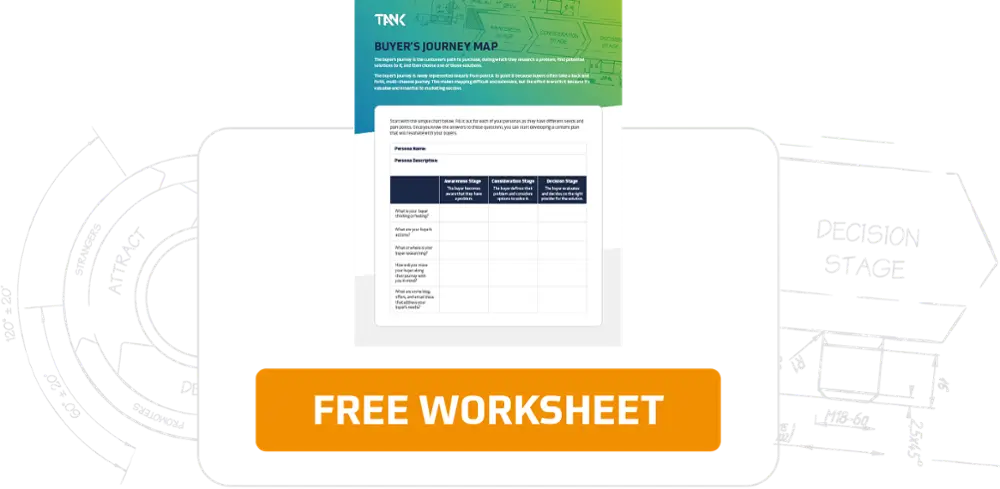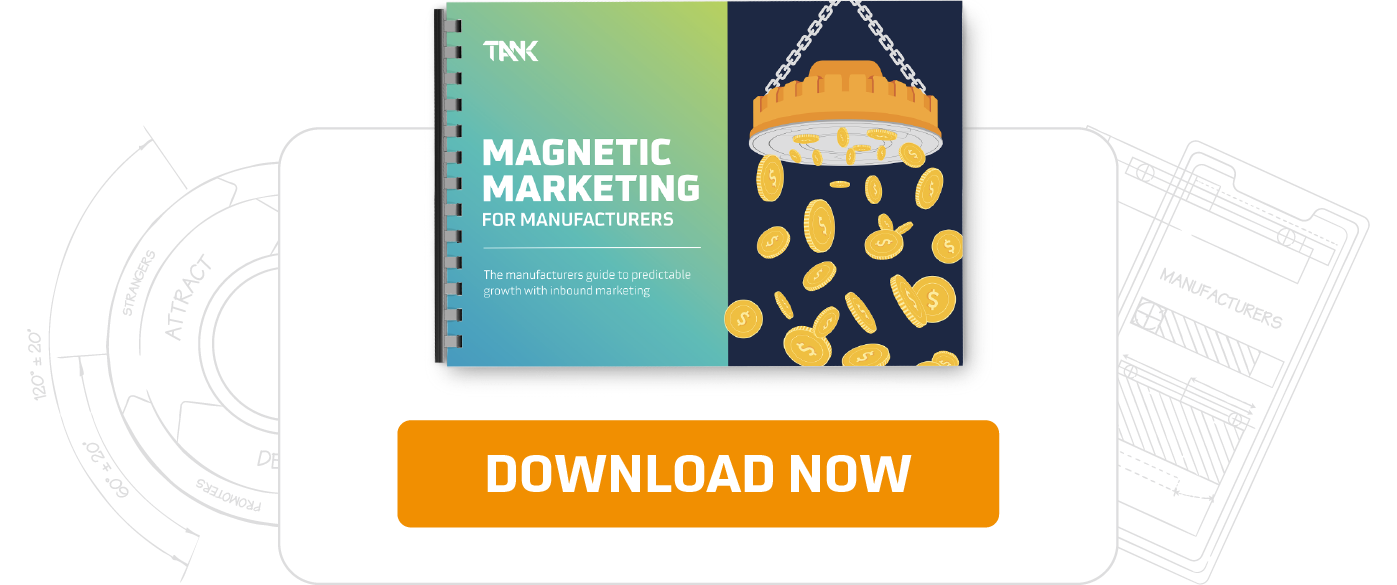How a Consistent Content Creation Strategy Drives Real Results
 Krista
|
Krista
|

The past couple of years has transformed how businesses, including those in manufacturing and B2B services, approach growth and customer engagement. While you may have perfected your product or service, there's a crucial element that could be missing from your strategy — a consistent, well-planned content marketing approach. It’s no longer enough to rely solely on traditional sales methods or in-person connections. Your audience is actively searching online for solutions to their problems, and if you’re not part of that conversation, you risk being overlooked.
For B2B and manufacturing companies, marketing can sometimes feel secondary to operations or product development. However, the reality is that businesses with a structured, ongoing content marketing plan are driving more qualified leads, enhancing brand visibility, and building stronger customer relationships. Content marketing isn’t just about writing blogs or posting updates on LinkedIn. It’s a deliberate, strategic approach that aligns with your business goals, nurtures prospects over time, and supports long sales cycles.
The beauty of content marketing lies in its flexibility — it allows you to address your audience’s specific pain points while also demonstrating the expertise and reliability your business offers. Regularly publishing relevant, educational content helps you become the go-to resource for your target audience, establishing trust and creating a steady flow of qualified leads. But many companies in the manufacturing and B2B sectors aren’t fully utilizing the power of a content strategy, or they’re doing it inconsistently, missing out on significant growth opportunities.
So, why does content marketing matter, and how can a structured, ongoing approach deliver real results for your business? Let’s break down why consistent content creation is crucial and explore how it can help you generate the right leads and sustain long-term growth.
Unlocking Growth: The Role of Consistent Content in B2B Marketing
In complex industries like manufacturing and B2B services, buyers don’t make snap decisions. The sales cycle can be long, often requiring months of research and multiple stakeholders weighing in before a final decision is made. As a result, your marketing efforts need to support prospects throughout every stage of their journey — from awareness to consideration and, finally, to decision.
But here’s the challenge: many of your potential customers are looking for answers long before they ever engage with a sales representative. In fact, studies show that buyers complete nearly 70% of their decision-making process before ever reaching out to a vendor. This means your content needs to be front and center, addressing their concerns and positioning your company as a trusted resource early in their journey.
Here are the key reasons why a consistent content creation strategy is essential for your business:
- Establishes trust and authority: When you consistently produce high-quality content that answers your audience’s most pressing questions, you position yourself as a trusted expert in your field. This authority helps build the confidence needed to turn prospects into customers.
- Supports long sales cycles: Unlike consumer purchases, B2B transactions are more deliberate, with multiple decision-makers involved. Consistent content helps nurture these leads over time, keeping your brand top-of-mind throughout the extended sales cycle.
- Improves lead quality: When you publish content that directly addresses the needs and challenges of your target audience, you attract more qualified leads who are genuinely interested in your solutions. This reduces time wasted on bad-fit leads and increases the chances of closing the deal.
- Boosts SEO and organic traffic: The more consistent your content efforts, the better your chances of ranking higher in search engines. Well-optimized blog posts, guides, and resources help improve visibility, driving organic traffic to your website and creating new opportunities for lead generation.
Content marketing isn’t a quick fix — it’s a long-term strategy that requires consistency and commitment. But when done right, it becomes a powerful engine for business growth.
Structuring a Successful Content Marketing Plan
A consistent content strategy doesn’t happen by accident — it requires thoughtful planning and a clear roadmap. Below are the key elements you should include in your content marketing plan to ensure you’re reaching your audience with the right message at the right time.
1. Set Clear, Measurable Goals
The first step in building a content strategy is identifying what you want to achieve. Whether your goal is lead generation, increasing brand awareness, or nurturing existing relationships, each piece of content should serve a specific purpose.
Examples of goals might include:
- Increase website traffic by 20% in 6 months.
- Generate 50 new leads per month through gated content.
- Improve search engine rankings for key industry terms.
Once you’ve set your goals, track the right metrics (such as website visits, form submissions, or engagement rates) to measure success and refine your strategy.
2. Understand Your Audience and Their Pain Points
In B2B and manufacturing, buyers are often more concerned with finding the right solution than getting the best deal. They want a partner who understands their unique challenges and can provide insights to solve them. Your content should reflect that.
For example:
- A logistics company might worry about supply chain disruptions.
- A factory manager might be looking for ways to reduce downtime and increase efficiency.
By understanding what’s driving your audience’s decision-making, you can create content that addresses their specific needs and positions your business as the go-to expert in your field.
Creating a Content Strategy: Plan for Consistency
To stay consistent, you need a plan. A content strategy not only helps you organize what to publish and when but also ensures you’re covering a range of topics that address different stages of your buyers’ journey — from awareness to consideration to decision.
How to Build a Content Calendar:
-
Identify key themes: What are the core topics that matter most to your audience? For example, you might focus on industry trends, technical challenges, or customer success stories.
-
Plan content types: Vary your content formats to keep your audience engaged. This could include blog posts, whitepapers, case studies, videos, or webinars.
-
Align with business milestones: Schedule content around important events like product launches, industry conferences, or seasonal promotions to ensure your marketing efforts are cohesive and timely.
With a content calendar in place, you’ll always know what’s coming next, keeping your team on track and ensuring your audience is regularly engaging with fresh content.
Advanced Tactics to Fuel Sustainable Growth
A solid foundation of regular blog posts and educational resources is essential, but to truly accelerate your marketing efforts, you’ll want to integrate some more advanced tactics into your strategy.
1. Search Engine Optimization (SEO)
While crafting high-quality content is vital, it won’t drive results unless people can find it. That’s where SEO comes in. Optimizing your content with the right keywords ensures your content ranks higher in search engines and reaches more potential buyers.
Key SEO Tips for B2B:
-
Focus on long-tail keywords specific to your industry, such as “B2B industrial software solutions."
-
Ensure mobile optimization to enhance user experience and search rankings.
Use internal linking to direct users to related content on your website, increasing dwell time and improving your SEO.
2. Repurposing High-Performing Content
Creating content doesn’t always mean starting from scratch. Repurposing existing content is one of the best ways to extend its life and reach new audiences. For example, you can turn a popular blog post into a webinar, transform a case study into a video, or summarize a whitepaper in a series of LinkedIn posts.
Repurposing also gives your best-performing content new life, allowing you to maximize the value of every piece you create.
The Power of a Structured Content Strategy in Action
Imagine you run a B2B manufacturing company focused on custom automation solutions. Over the past year, you’ve implemented a consistent content strategy that includes monthly blog posts, customer success stories, and detailed product guides. You’ve also automated email campaigns to nurture leads based on where they are in the buyer’s journey.
What results can you expect? Over time, you’ll start to see more organic traffic from search engines, greater engagement on social media, and a steady stream of qualified leads flowing into your sales pipeline. Most importantly, by consistently providing valuable, relevant content, you’ll become the trusted partner your prospects turn to when they’re ready to buy.
For a real-world example of how a consistent content strategy can drive results, check out our Dakota Storage Buildings case study to see how modern marketing helped them grow their business and attract more qualified leads.
Ready to Fuel Growth with Consistent Content?
Implementing a consistent, structured content creation strategy is more than just a marketing tactic — it’s a powerful way to generate leads, nurture long sales cycles, and build lasting trust with your audience. In the competitive B2B and manufacturing sectors, regularly delivering valuable, relevant content can set your business apart and lead to sustained growth.
But you don’t have to go it alone. At TANK New Media, we specialize in creating targeted marketing strategies that drive results for manufacturers and B2B companies. Want to learn more about how to implement a scalable content strategy for your business?
Download our free guide, Magnetic Marketing for Manufacturers, packed with actionable insights to help you attract, engage, and convert your ideal customers. Take the first step toward building a content marketing plan that fuels your growth.
Subscribe to Our Blog
Stay up to date with the latest marketing, sales, and service tips.




